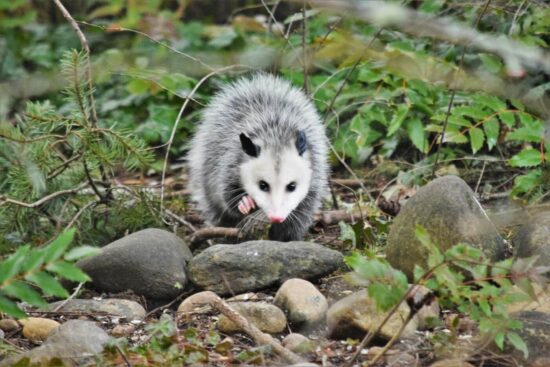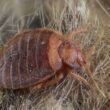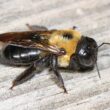If you’ve ever spotted a possum waddling through your backyard at night, you might wonder what these unusual creatures are looking for. These North American marsupials have some pretty interesting eating habits that might surprise you. Understanding what possums eat can help you appreciate these misunderstood animals and know how to handle them around your property.
Possums are omnivores, which means they eat both plants and animals. They’re also opportunistic feeders, so they’ll munch on pretty much whatever they can find. This flexible diet has helped them survive for millions of years, even dating back to the time of dinosaurs! While they might look a bit odd with their pointy faces and hairless tails, possums actually play an important role in keeping ecosystems healthy.
Let’s take a closer look at the main things that make up a possum’s menu.
1. Insects and Bugs
Possums eat various insects including beetles, ants, termites, grasshoppers, crickets, cockroaches, and other bugs commonly found in yards and gardens. These crunchy critters provide lots of protein that possums need to stay healthy and active.
During the warmer months of spring and summer, insects become an even bigger part of what possums eat. They use their excellent sense of smell to sniff out bugs hiding under logs, in leaf piles, and around garden areas. Their sharp claws help them dig up insects from the soil too.
Garden owners often appreciate this aspect of possum behavior. By eating pest insects that might otherwise damage plants, possums provide free, natural pest control. They’re especially helpful at reducing populations of beetles and other bugs that can harm vegetables and flowers.
2. Ticks (The Controversy)
There’s been a lot of talk about possums and ticks over the years. Earlier studies suggested possums could eat thousands of ticks per season through grooming, potentially reducing Lyme disease spread. This led many people to view possums as tick-fighting heroes.
However, the truth is more complicated. More recent field research found no evidence of ticks in wild possum stomach contents, suggesting laboratory studies may not reflect natural behavior. Scientists think that possums in labs ate ticks because they had nothing else to do, but wild possums are too busy searching for other food.
While possums might groom off and eat some ticks that attach to their bodies, they’re probably not the tick-eating machines people once thought. Still, they do help control other pests, so they’re far from useless!
3. Snails and Slugs
Snails and slugs are high in protein, vitamins, and minerals, making them a favorite food source for possums. These slimy garden pests don’t stand a chance when a hungry possum comes around at night.
Gardeners really love this part of the possum diet. Snails and slugs can absolutely destroy vegetable gardens and flower beds, leaving behind trails of damaged leaves and eaten seedlings. Possums help keep these populations under control without any chemicals or traps needed.
The slow-moving nature of snails and slugs makes them easy targets for possums. Since possums aren’t the fastest animals themselves, they prefer prey that won’t put up much of a fight or try to escape quickly.
4. Small Rodents (Mice, Rats, and Voles)
Possums eat rodents including mice and rats, which is great news for homeowners dealing with these pests. While they don’t actively hunt rats, possums will eat them when encountered, especially when hungry.
Rodents can cause serious problems around homes and gardens. They chew through wires, contaminate food supplies, and reproduce incredibly quickly. Having possums around can help keep rodent numbers down naturally.
Possums catch rodents using their sharp teeth and claws. They have more teeth than any other North American mammal, which makes them well-equipped for grabbing and eating small prey. Young or injured rodents are especially vulnerable to becoming possum snacks.
5. Snakes (Including Venomous Species)
Here’s where possums get really impressive. Possums have evolved resistance to venom from various pit vipers including rattlesnakes, copperheads, and cottonmouths. This amazing adaptation lets them hunt and eat snakes that would kill most other animals.
Scientists have found that possums can survive the equivalent of 80 rattlesnake bites worth of venom. Special proteins in their blood neutralize the dangerous toxins found in snake venom. Researchers are even studying these proteins to develop better antivenoms for human snakebite victims.
When possums encounter snakes, they use their quick reflexes and sharp teeth to catch and kill them. They typically start eating from the head down, which eliminates the venomous fangs first. This behavior makes possums valuable for controlling snake populations, especially in areas where venomous species live.
6. Fruits and Berries
Possums have quite the sweet tooth when it comes to fruit. Possums eat soft, sweet fruits including berries, stone fruits, and tropical fruits, with favorites being figs, apples, grapes, papaya, and bananas. They especially love strawberries, blackberries, raspberries, and blueberries.
Possums generally prefer fallen, partially rotted fruit over fruit still on trees. This preference actually helps gardeners in some ways. By cleaning up overripe fruit from the ground, possums prevent the spread of brown rot and reduce fruit fly populations.
The natural sugars in fruit give possums quick energy. Since they have fast metabolisms and need to eat frequently, fruit serves as an excellent high-calorie food source. Stone fruits like peaches, plums, and cherries are particularly popular when they’re in season.
7. Carrion and Roadkill
This might sound gross, but it’s actually one of the most beneficial things possums do. Possums will eat carrion and are often seen eating roadkill, which helps prevent disease spread by cleaning up dead animals. Without scavengers like possums, dead animals would rot for much longer and attract flies and bacteria.
This scavenging behavior has earned them the nickname “Nature’s Little Sanitation Engineer”. They perform an important cleanup service that keeps the environment healthier for everyone.
Possums need lots of calcium in their diet, and they get much of it from eating the bones of dead animals. Their strong teeth can crunch through skeletal remains that other animals can’t handle. This unusual dietary requirement is why possums will eat the entire carcass, not just the meat.
8. Birds and Eggs
While possums aren’t skilled hunters of healthy adult birds, they will eat birds when the opportunity arises. Possums don’t actively hunt birds, but possums will eat the young or injured, and unattended nests with eggs or fallen baby birds can become meals.
Possums are decent climbers despite their somewhat clumsy appearance. They can climb trees using their sharp claws and prehensile tails to reach bird nests. Baby birds that have fallen from nests are especially vulnerable since they can’t fly away.
Bird eggs provide excellent nutrition with lots of protein and fat. During nesting season in spring, possums might check trees and shrubs for accessible nests. However, most birds build nests high enough or in secure enough locations that possums can’t reach them easily.
9. Frogs and Amphibians
Frogs are part of the possum’s diverse animal protein sources, especially in areas near water where amphibians are common. Possums hunt for frogs around ponds, streams, and wet areas in yards and gardens.
The slow movement of many frogs makes them easy targets for possums. Unlike insects that can fly away or rodents that run fast, frogs often freeze when threatened. This defense mechanism doesn’t work well against possums.
Frogs and toads come out at night, which is the same time possums are most active. This overlap in activity periods means possums regularly encounter amphibians during their nighttime foraging trips. The moist environments where frogs live also attract other foods like slugs and insects.
10. Garden Vegetables
Possums eat vegetables including carrots, lettuce, and sweet potatoes, and may also consume plant leaves and flowers. This is where possums can become a bit of a nuisance for people trying to grow their own food.
However, the damage possums cause to gardens is often less severe than their reputation suggests. They typically prefer fallen or overripe produce rather than picking fresh vegetables. Tomatoes that have fallen to the ground or overly ripe squash are more likely to attract possums than pristine vegetables.
Some vegetables seem more appealing to possums than others. Leafy greens, corn, and root vegetables can all end up on the possum menu. Protecting gardens with fences or bringing in ripe produce promptly can help reduce possum raids.
11. Nuts and Seeds
Fruits, flowers, nuts, and seeds are important components of the possum diet. These plant-based foods provide essential fats, vitamins, and minerals that keep possums healthy.
Nuts are especially valuable during fall and winter when other food sources become scarce. Possums will crack open acorns, walnuts, and other nuts they find on the ground. Their strong jaws and numerous teeth make this task easier than it would be for smaller animals.
Seeds from various plants also supplement the possum diet. Birdseed left in feeders or spilled on the ground will definitely attract possums. They’re not picky about seed types and will munch on sunflower seeds, millet, and other varieties meant for wild birds.
12. Pet Food
Possums eat dog food, cat food, and table scraps when accessible. This is one of the most common ways possums interact with humans in suburban and urban areas. Pet food left outside homes is commonly consumed by possums, especially in urban areas where natural food sources are scarce.
Many pet owners discover possums at their feeding stations late at night. The high protein content in commercial pet food makes it very attractive to hungry possums. Both dry kibble and wet food will disappear quickly if left outside after dark.
To avoid feeding possums accidentally, pet owners should bring food bowls inside at night. Possums can also get bold enough to eat from bowls even while pets are nearby, especially if the pets are small or not aggressive. This can lead to conflicts between pets and wildlife.
13. Garbage and Human Food Scraps
In urban settings, possums frequently raid bins and eat from rubbish left on the ground or picnic tables, typically favoring fruit and bread. Their incredible sense of smell helps them locate garbage cans from far away.
Possums aren’t as strong or destructive as raccoons when it comes to getting into trash. They prefer garbage cans that are already open or have weak lids. Once inside, they’ll sort through the contents looking for the tastiest items.
Human food waste provides easy calories for possums living near people. Pizza crusts, leftover sandwiches, and food packaging with residue all attract these opportunistic feeders. Using secure, lockable garbage cans can prevent possums from making a mess while searching for snacks.
14. Skeletal Remains and Bones
Here’s one of the strangest things about what possums eat. Possums have a high calcium requirement, which means possums will eat skeletal remains of rodents and other roadkill animals. This unusual dietary need sets them apart from many other omnivores.
Calcium is crucial for possums to maintain strong bones and teeth. Since they have so many teeth (50 in total!), they need more calcium than you might expect. Crunching on bones from dead animals helps them meet this nutritional requirement.
Their powerful jaws can break down bones that would be too hard for other small mammals. This ability to extract nutrients from skeletal remains is part of what makes possums such successful scavengers. Nothing goes to waste when a possum finds a carcass!


